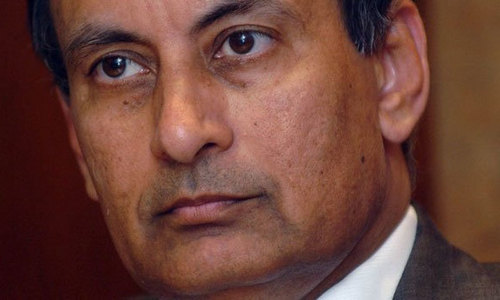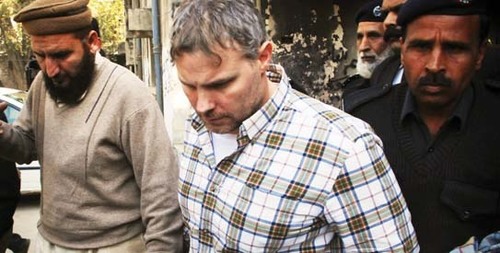Nothing intrigues me more than the power of our security establishment. National interest is shorthand for the interests of an institution that reigns supreme. Let us consider the recent news that has gone largely unnoticed or has been deliberately ignored. Hillary Clinton’s presidential campaign received a jolt when the State Department confirmed she had used her personal server to send some top secret emails.
Our present envoy to the UN Maleeha Lodhi apparently acted as an informal messenger between the US administration and former army chief Gen Ashfaq Kayani, going by the contents of an email to secretary Clinton from Vali Nasr, then a senior adviser. However, the entire message that Ms Lodhi shared with Mr Nasr was edited out of the text. It was sent three days after Raymond Davis’s arrest in Lahore on Jan 17, 2011, on charges of killing two men. The incident had caused a serious rift in US-Pakistan ties.
While the US authorities have so far kept the Pakistani general’s message secret, may we in Pakistan ask our military authorities and the Foreign Office what information or message was conveyed by the chief through non-diplomatic and informal channels days after the Raymond Davis incident in Lahore? Our political and diplomatic authorities had cried themselves hoarse over the American’s non-diplomatic status and a murder case was registered by Lahore Police. What happened after some time was a compromise surreptitiously achieved before a court of law invoking provisions of ‘diyat’ or compensation money and the killer was whisked away by our spooks to a plane waiting to take him back to the US.
No one had the courage to ask the military elite some tough questions.
It was the same army chief during whose tenure US Navy SEALS conducted a raid in May 2011 in Abbottabad — near a military academy and garrison stationed nearby — and reportedly found and killed Osama bin Laden. After that, the civilian political authorities allegedly used informal means through a serving ambassador in Washington to send a message across to the US military chief to use his influence to persuade his Pakistani counterpart and ‘buddy’ not to overthrow the inept political leadership in the wake of the resultant public outcry.
If a military chief resorts to informal diplomacy through a former diplomat, it is kosher; if the political leadership tries to convey a message through informal sources, the establishment cries ‘foul’.
Remember Memogate? Let us briefly recapitulate. An op-ed in the Financial Times on Oct 10, 2011 created a furore in Pakistan. Mansoor Ijaz, an American of Pakistani ancestry, wrote a damning indictment of the ISI, stating that after the raid, “a senior Pakistani diplomat telephoned me with an urgent request”. He wrote: “Asif Ali Zardari … needed to communicate a message to White House national security officials that would bypass Pakistan’s military and intelligence channels”. He said that “the president feared a military takeover was imminent. He needed an American fist on his army chief’s desk to end any misguided notions of a coup….”
The memorandum was reportedly delivered to Adm Mike Mullen on May 10, 2011 requesting his “direct intervention in conveying a strong, urgent and direct message to Gen Kayani that delivers Washington’s demand for him and Gen Pasha to end their brinkmanship aimed at bringing down the civilian apparatus — that this is a 1971 moment in Pakistan’s history”.
This was explosive stuff. Who in his right mind would offer such terms of abject surrender to the US interests and that too in writing? What was the Zardari-Haqqani duo up to? Could a Pakistani ambassador ever write such a petition? Was he representing Islamabad or Washington? Ambassador Haqqani was recalled from Washington.
The real target of petitions moved before the Supreme Court by Mian Nawaz Sharif and others became apparent. A full bench conducted a hearing on Dec 1, 2011. Nawaz Sharif himself appeared in court and spoke. The registrar called me during the proceedings to say the court was considering my name as independent investigator in the memo case. I told him I first wanted to see the court order and the terms of reference.
Meanwhile, the order was announced the same day. Why this haste? Why no notice to the state and respondents before appointing a commission? I thought I would be called to court at the next hearing and my consent would be sought. Instead, I received a court order on Dec 2 seeking my consent “with respect to performing national duty as head of the commission”.
What was it all about? Was it a ‘national duty’ that I was being called upon to perform or act as a hatchet man on behalf of the security establishment who were gunning for Zardari and his henchman in Washington? What was Nawaz Sharif doing in court looking like an advocate? What happened to the Charter of Democracy? Was he being used by the establishment? Why was I being dragged into political intrigue or a case in which I might have questioned the motives of the clandestine meetings between the former ISI chief and a man with alleged links to Washington? Memogate smacked of intrigue. I responded immediately and expressed my inability to undertake the assignment as head of the memo commission.
Memogate was no Watergate. Like Nixon, Zardari did not have to resign. It got one scalp — that of Hussain Haqqani, who was alleged to have had the memo written and conveyed to Mike Mullen. No heads rolled after the OBL raid; no one had the courage to ask the military elite some tough questions.
The establishment has acquired the art of turning its strategic follies to triumphs. It is this deep state that has curtailed and trimmed democracy, ensuring the country stays rigged in favour of a small but self-aggrandising elite. And until that changes, democracy in Pakistan will remain imperiled.
The writer is former DG, FIA.
Published in Dawn, February 22nd, 2016


















































